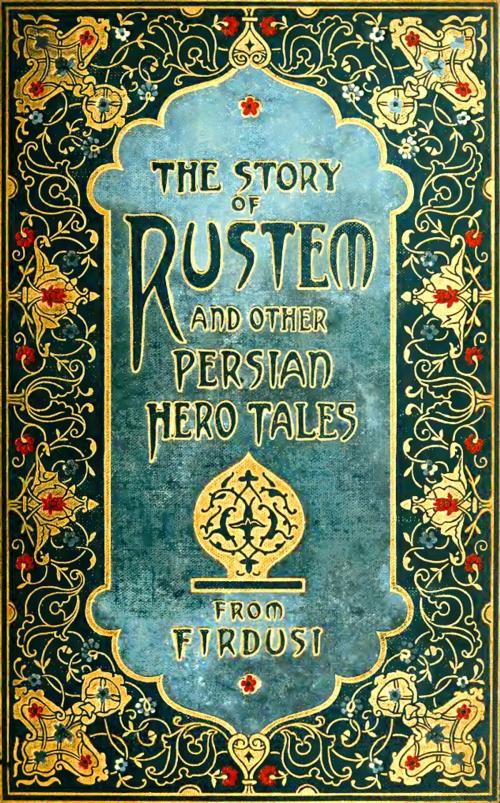The Story of Rustem and Other Persian Hero Tales from Firdusi
(Illustrated + Active TOC)
Fiction & Literature, Literary Theory & Criticism, Children&| Author: | ELIZABETH D. RENNINGER | ISBN: | 1230000101556 |
| Publisher: | Clazzic Publishing | Publication: | January 20, 2013 |
| Imprint: | Language: | English |
| Author: | ELIZABETH D. RENNINGER |
| ISBN: | 1230000101556 |
| Publisher: | Clazzic Publishing |
| Publication: | January 20, 2013 |
| Imprint: | |
| Language: | English |
Firdusi was a Persian poet, author of the Shah Namah [the book of kings], the great Persian epic. His original name was Abul Kasim Mansur; he is thought to have been born of a yeoman family of Khorasan. He received a thorough education in Muslim learning and in the Persian language and antiquities. The course of his life is not certain because of the immense accretion of legend about it. He lived at the court of Mahmud of Ghazna, with a group of antiquarians. Firdusi undertook his epic history of Persia dealing with the period from the arrival of the Persians to that of the Arabs to glorify Persia's past.He dedicated the work to the king, who paid him less than Firdusi expected. The poet wrote a savage satire on the king (usually prefaced to editions of the Shah Namah) and fled. He wandered from court to court and arrived in his old age at his home. His poem, in 60,000 verses, is the first great work of modern Persian literature. In it Firdusi set the mark for Persian poetry with his even rhyme, stately cadences, and continuous flow. The poem has taken a singular place in Iran, and long sections of it are recited by illiterate tribespeople.
Once upon a time, not so many years ago, a librarian in one of our large cities conceived the idea of forming a hero club for the boys of her neighborhood. So it ame to pass that for two years, every Wednesday evening, between thirty and fifty young heroes assembled in the club-room of the library to listen to the story of some great hero, told either by the librarian or by some visiting story-teller.
Now, as the object of the club was not only amusement, helpful entertainment, and inspiration, but also to influence the boys' reading, they were introduced first to the Greek heroes: Theseus, Perseus, Hercules, Jason, and the heroes of Troy. And after these came the heroes of chivalry: Charlemagne, Roland, Oliver, Ogier the Dane, and the four Aymon brothers. Then followed Siegfried, King Arthur, and the Red Cross Knight. Yea, and even that gay little fellow in green brave Robin Hood. And sprinkled in with these more or less mythological heroes were those of a more practical type: Father Damien, Livingstone, Lincoln, Peter Cooper, and a number of every-day heroes who so well exemplify the growth in heroic ideals in our century as contrasted with those of primitive times. Boy Heroes were also presented, and finally, in her search for good story-hour material, the librarian decided to introduce the boys to some of the great Persian heroes they being not so well known.
Firdusi was a Persian poet, author of the Shah Namah [the book of kings], the great Persian epic. His original name was Abul Kasim Mansur; he is thought to have been born of a yeoman family of Khorasan. He received a thorough education in Muslim learning and in the Persian language and antiquities. The course of his life is not certain because of the immense accretion of legend about it. He lived at the court of Mahmud of Ghazna, with a group of antiquarians. Firdusi undertook his epic history of Persia dealing with the period from the arrival of the Persians to that of the Arabs to glorify Persia's past.He dedicated the work to the king, who paid him less than Firdusi expected. The poet wrote a savage satire on the king (usually prefaced to editions of the Shah Namah) and fled. He wandered from court to court and arrived in his old age at his home. His poem, in 60,000 verses, is the first great work of modern Persian literature. In it Firdusi set the mark for Persian poetry with his even rhyme, stately cadences, and continuous flow. The poem has taken a singular place in Iran, and long sections of it are recited by illiterate tribespeople.
Once upon a time, not so many years ago, a librarian in one of our large cities conceived the idea of forming a hero club for the boys of her neighborhood. So it ame to pass that for two years, every Wednesday evening, between thirty and fifty young heroes assembled in the club-room of the library to listen to the story of some great hero, told either by the librarian or by some visiting story-teller.
Now, as the object of the club was not only amusement, helpful entertainment, and inspiration, but also to influence the boys' reading, they were introduced first to the Greek heroes: Theseus, Perseus, Hercules, Jason, and the heroes of Troy. And after these came the heroes of chivalry: Charlemagne, Roland, Oliver, Ogier the Dane, and the four Aymon brothers. Then followed Siegfried, King Arthur, and the Red Cross Knight. Yea, and even that gay little fellow in green brave Robin Hood. And sprinkled in with these more or less mythological heroes were those of a more practical type: Father Damien, Livingstone, Lincoln, Peter Cooper, and a number of every-day heroes who so well exemplify the growth in heroic ideals in our century as contrasted with those of primitive times. Boy Heroes were also presented, and finally, in her search for good story-hour material, the librarian decided to introduce the boys to some of the great Persian heroes they being not so well known.















